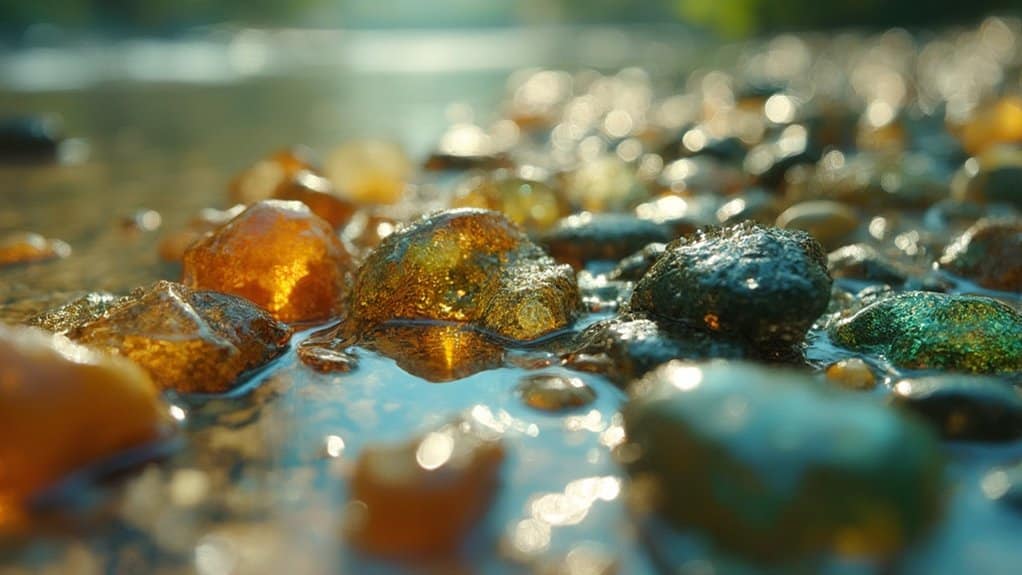Resin-bound gravel blends a tough two-part polyurethane resin with carefully chosen aggregates. The resin offers UV protection and strength, much like a protective coat of varnish on wood, whilst preventing common issues like cracking. Think of natural stone or recycled glass as the ideal aggregates – they're mixed at a 3:1 ratio with the resin for the best results. Clean, dry aggregates are absolutely crucial – rather like ensuring a wall is properly prepped before painting. With loads of colours available, from warm honey-toned gravels to sleek greys, it's a practical choice for British driveways and paths. Worth noting that proper installation makes all the difference to how well it performs in our weather.
Key Takeaways
The Key Elements of Resin-Bound Gravel
- A specialised two-part polyurethane resin forms the backbone of resin-bound gravel, much like strong glue, creating a flexible surface that won't crack in British weather.
- Top-notch stones or recycled glass make up the aggregate portion – think of it as choosing quality ingredients for a recipe. The better the materials, the longer your surface will last.
- Mix three parts aggregate with one part resin for the perfect blend, rather like mixing concrete. Different stone sizes might need slight adjustments.
- With over 40 colours to choose from, you can match your driveway or garden path to your house's brickwork or garden features – from warm honey tones to sleek greys.
- The surface lets rainwater drain through naturally, unlike concrete or tarmac. This helps prevent puddles and meets UK drainage regulations, particularly handy during our wet winters.
Resin Component

The resin component is crucial for resin-bound gravel systems, much like cement is to concrete.
Most systems use a two-part resin that's both tough and UV-stable. Made from polyurethane, the resin firmly bonds with stones whilst staying flexible enough to move with the ground, preventing cracks – think of it as a strong but stretchy glue. The resin's UV protection stops it from yellowing or fading in sunlight, which is particularly important for British weather conditions. Additionally, the resin-bound gravel surface is designed to be visually appealing while offering excellent drainage properties, contributing to eco-friendly outdoor solutions. The resilience of the resin and its UV-stable solutions enables the surface to endure variations in weather without compromising its integrity.
All quality resins should meet BS EN UKAS ISO9001 standards.
For best results, mix 3 parts aggregate with 1 part resin by weight, ensuring each stone is thoroughly coated.
Aggregates
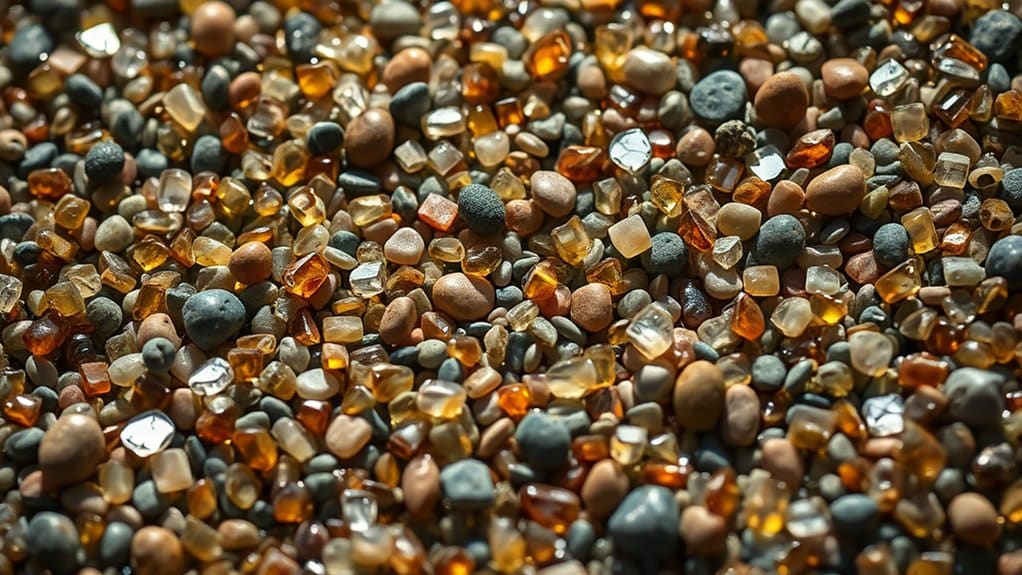
Choosing the right aggregates for resin-bound surfaces is essential for both durability and looks. Natural stones like gravel or crushed stone work well, as do eco-friendly options such as recycled glass. The source of your aggregates matters – quality materials ensure a strong, attractive finish. Knowledge of surface compatibility ensures that your selected aggregates will perform well on the intended substrate. To enhance performance, you should consider aggregate properties, as their characteristics play a significant role in the overall success of the project.
For driveways, 1-3mm aggregates are ideal, whilst larger sizes suit tree pits and areas needing better drainage. Your aggregates must be properly washed and kiln-dried to keep moisture levels low – crucial for proper resin binding.
Keep an eye on maintenance to protect your surface's appearance and function. The right aggregate choice makes all the difference to how your resin-bound surface performs and looks over time.
Mixing Ratios
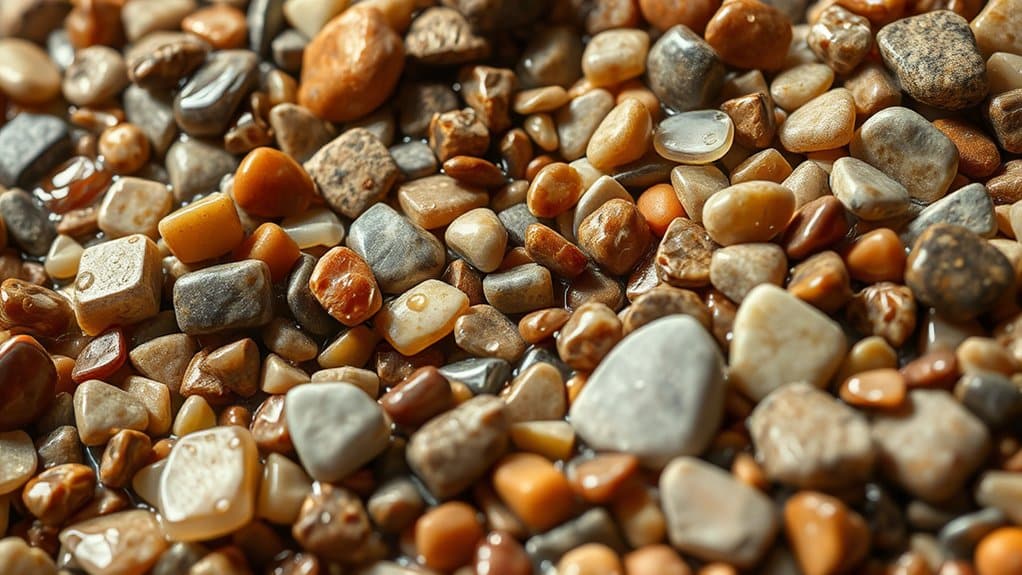
The standard ratio for resin-bound gravel is 3:1 (three parts aggregate to one part resin). This mix creates the strongest, most durable surface for paths and driveways. The ratio might need slight tweaks depending on your stone size – larger aggregates sometimes need a touch more resin, whilst smaller ones may need less. Getting this balance right ensures your surface won't crack or crumble over time. Understanding the importance of polymer nanocomposites can also enhance the durability and performance characteristics of such surfaces. Additionally, using high-quality aggregates in the mix can further improve the surface's resistance to wear and environmental factors.
Optimal Aggregate Ratio
Optimal Aggregate Mix for Resin Surfaces
Getting the right mix ratio for resin-bound gravel is crucial for a tough, good-looking surface. Mix these components:
- Stone Size Mix: Combine 75kg of 2-5mm stones with 25kg of 1-3mm stones – think of it as mixing gravel roughly the size of peppercorns with ones closer to coarse salt.
- Sand Addition: Work in C52 sharp sand for a smoother finish, much like adding flour to cake mix.
- Resin Amount: Use 7.05% resin by weight – roughly 7kg per 100kg of aggregate.
- Mixing Method: Keep mixing time the same for each batch to avoid patchy colours, similar to mixing paint.
Whilst these ratios work well for most projects, you might need slight adjustments based on your specific requirements.
Impact on Strength
Achieving proper strength in resin-bound gravel depends heavily on correct mixing ratios. Use 3 parts aggregate to 1 part resin by weight for optimal results. The resin to hardener ratio should be 1:1.03-1.05 – get this wrong and you'll end up with a weak or brittle surface.
For the best bond strength, ensure all stones are thoroughly coated with resin. A forced action mixer works brilliantly for even coverage – much like coating chocolate on nuts, every bit needs proper coverage.
Your aggregates must be clean and dry, just as you wouldn't build on muddy foundations.
Think of it like baking – the right measurements and proper mixing technique make all the difference between success and failure. Skip these steps, and you risk a surface that won't stand up to daily wear and tear.
Color Options
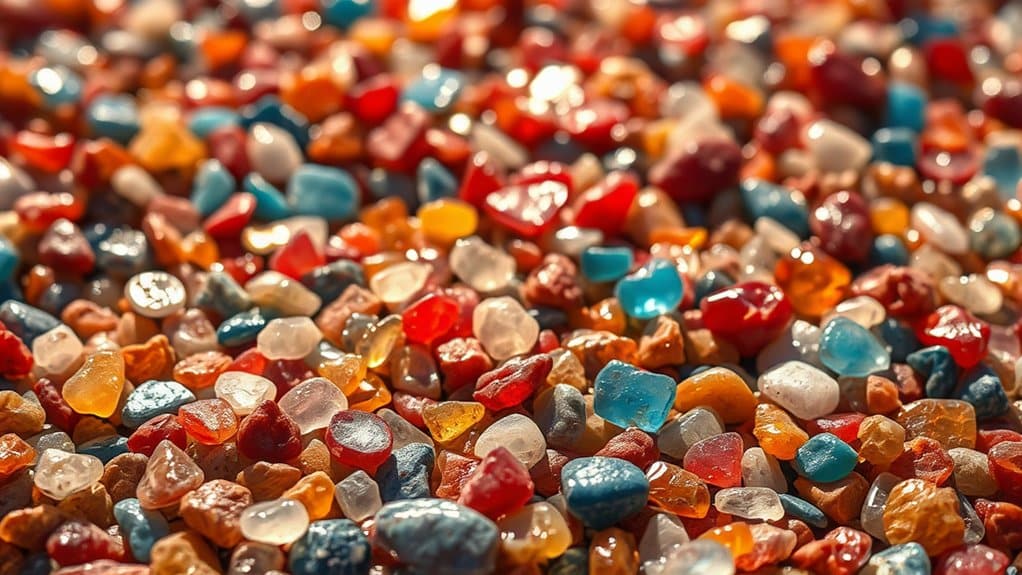
Resin-bound gravel comes in countless colours, from natural browns and greys to bold reds and golds.
Choose shades that complement your property and garden style – popular choices include warm buff tones for traditional homes and sleek silver-greys for modern spaces.
The different stone sizes available also create varied textures, letting you achieve exactly the look you want.
Wide Color Spectrum
Resin-bound gravel comes in more than 40 colours, perfect for creating your ideal outdoor space. Choosing the right colour scheme matters for both look and feel.
Four key points to consider:
- Versatility: Mix natural earth tones for a classic garden look, or opt for bold shades to make a statement.
- Trends: Contemporary greys and silvers work brilliantly with modern homes, whilst warm golds suit period properties.
- Custom Designs: Blend multiple colours to create distinctive patterns – particularly effective for driveways or company logos.
- Cohesion: Match your colour choice with existing brickwork and garden features for a polished finish.
Smart colour selection transforms ordinary spaces into standout gardens and driveways that complement your property perfectly.
Texture Variations Available
Resin-bound gravel comes in several texture options to suit different needs. The smooth, unbroken surface looks smart whilst keeping weeds at bay and preventing loose stones from scattering – particularly useful for driveways and paths.
Different aggregate sizes create distinct textures:
| Aggregate Size | Texture Type |
|---|---|
| 1-3mm | Fine, smooth finish |
| 2-5mm | Balanced, versatile |
| 5-10mm | Coarse, strong |
Choose finer aggregates for a sleek patio finish, or opt for coarser stones to boost grip on sloped surfaces. The size and type of stone affect both how long it lasts and how well it drains.
You can match the texture to your property style and practical requirements – whether that's a modern look for your garden path or a hardwearing surface for your car park.
Permeability
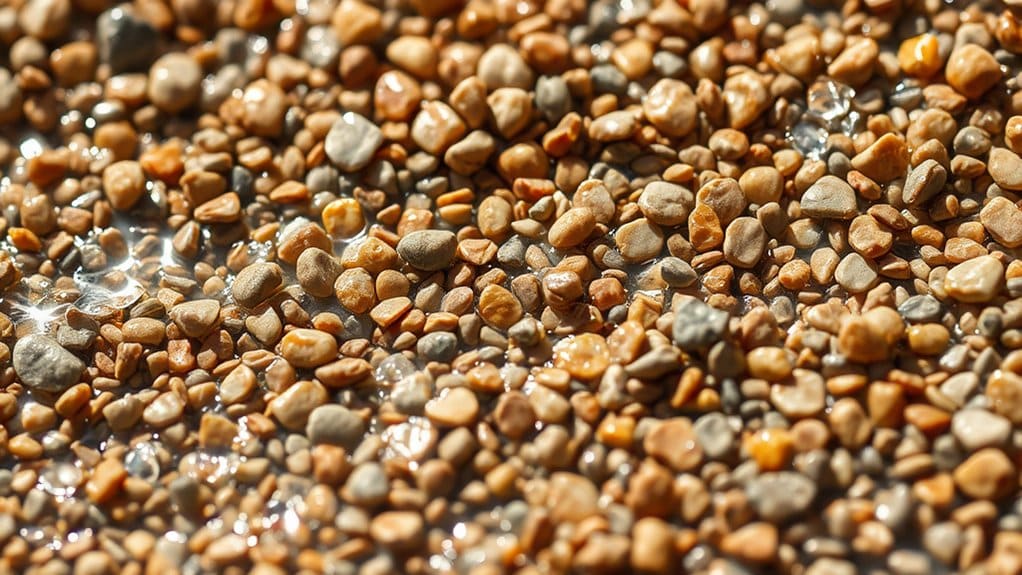
Permeability in resin-bound gravel is vital for managing water on your property, letting rainwater drain naturally through the surface rather than forming puddles or flooding.
The system offers four key advantages:
- Rainwater Soaks Through: Rain passes straight through the surface instead of pooling or running off.
- Tops Up Ground Water: Natural drainage helps maintain local water tables.
- Stops Flooding: The surface's tiny holes prevent water build-up, particularly useful during heavy British downpours.
- Meets UK Regulations: Fully compliant with SuDS (Sustainable Urban Drainage Systems), making it a practical choice for UK properties.
Think of it like a coffee filter – water passes through whilst keeping the surface stable and usable.
Perfect for our wet British weather.
Quality Requirements for Aggregates
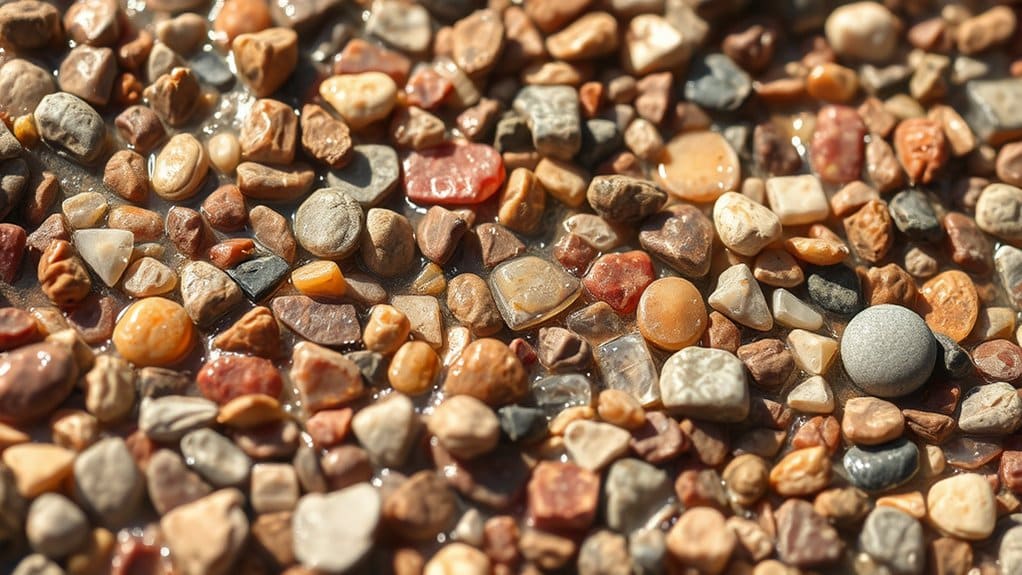
Quality aggregates are vital for durable resin-bound gravel surfaces. The material must be clean, dry and dust-free to bond properly with the resin. Wet or dirty aggregates often cause surface defects, including blooming and patchy areas.
Regular testing ensures each batch meets UK standards. Proper screening and washing help achieve the right grade and cleanliness – much like sifting flour for baking.
Strong packaging protects the material during transit, particularly from Britain's damp weather.
For the best results, source aggregates from established UK suppliers who maintain consistent stock levels and quality. Think of it as choosing reliable building blocks – the better the foundation, the stronger the finished surface.
Environmental Impact
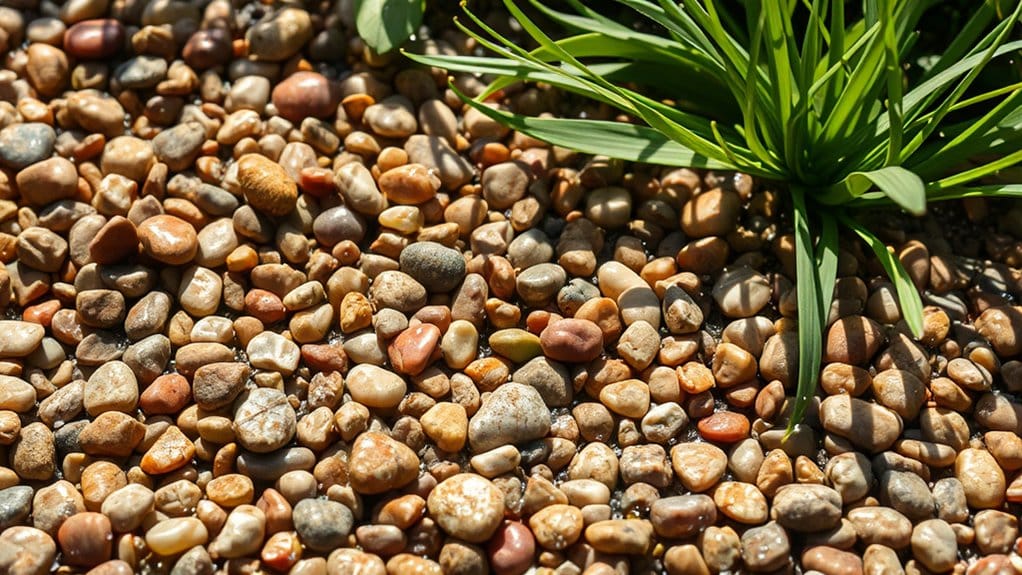
Environmental Impact of Resin-Bound Gravel
The environmental effects of resin-bound gravel must be weighed carefully:
- Permeable Surface: Works like a natural drainage system, much as you'd find in a garden. Rainwater seeps through rather than flooding pavements, helping top up groundwater levels.
- Pollution Control: Acts as a natural filter – think of it as a giant sieve catching harmful substances before they reach our waterways.
- Non-Renewable Materials: Most resins come from petroleum, similar to plastic products. This isn't brilliant for sustainability, particularly as oil resources dwindle.
- Disposal Challenges: Won't break down naturally in landfills, rather like old plastic furniture.
Creates long-term waste management headaches for local councils.
Frequently Asked Questions
How Long Does Resin-Bound Gravel Last Before Needing Replacement?
Resin-bound gravel lasts around 20-25 years when properly installed and maintained. Much like a good driveway, its longevity depends on British weather exposure, regular maintenance and proper ground preparation. With basic care, such as occasional jet washing and keeping on top of any small repairs, you'll get the maximum lifespan from your resin surface.
Can Resin-Bound Gravel Be Installed Over Existing Surfaces?
Resin-bound gravel can indeed be laid over existing surfaces, much like adding a new layer to your garden path or driveway. With proper preparation and professional installation, this surface treatment offers a durable, stable finish whilst maintaining a smart appearance. Crucially, the base surface must be sound, clean and suitable for overlay.
Is Resin-Bound Gravel Suitable for Extreme Weather Conditions?
Resin-bound gravel stands up brilliantly to British weather extremes, from harsh winter frosts to summer heatwaves. The material's robust bonding keeps stones firmly in place whilst allowing for natural expansion and contraction during temperature swings. Whether it's dealing with icy December mornings or August downpours, this surface maintains its grip and structure, making it a reliable choice for UK driveways and paths.
How Do I Clean and Maintain Resin-Bound Gravel Surfaces?
Regular sweeping and gentle hosing keep resin-bound gravel surfaces in top condition. For everyday maintenance, remove leaves and debris promptly, much like you would with a garden path. If you spot oil or fuel stains, tackle them quickly with warm soapy water – the kind you'd use to wash your car. Skip harsh chemicals and pressure washers, as these can damage the surface. Think of the resin binding as a protective coat; treat it with care, and it'll keep your driveway or patio looking smart for years.
What Is the Cost Comparison With Other Surfacing Options?
Resin surfaces stack up well against other popular options in the UK market. Whilst the initial cost might be higher than concrete or tarmac, resin-bound surfaces often prove more cost-effective over time. A typical block paving project needs regular maintenance and weed control, whereas resin surfaces require minimal upkeep. Traditional gravel drives need frequent topping up, but resin surfaces maintain their look for years with basic cleaning. When factoring in long-term costs, resin becomes a sensible investment for British homeowners.
Conclusion
The success of resin-bound gravel surfaces relies heavily on proper composition. Using high-grade resin, quality aggregates and correct mixing ratios ensures a robust finish that's both practical and visually striking. Much like choosing the right materials for a solid house foundation, each component plays a vital role in the final result. With the UK's varied weather conditions, proper composition becomes especially crucial for durability and drainage. A well-made surface will serve you well for years whilst maintaining its environmental benefits.
